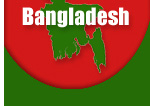Bangla is the official language of Bangladesh. It is also spoken in West Bengal.
Bangalees
protected Bangla from the clutches of Pakistani oppressors in 1952 by
preventing Urdu from being the state
language of East Pakistan where a vast majority of people spoke in Bangla.
Bangalees had to sacrifice lives for their mother tongue on 21st February,
1952. 21st February being declared International Mother Language Day by UNESCO, Bangla reached the
peak of maturity.
Evolution
Bangla's direct
ancestor is a form of Magadhi Prakrit or Middle Indo-Aryan which descended from
Sanskrit or Old Indo-Aryan. Bangla evolved mainly from Sanskrit. Also
Hindi, Urdu, Farsi,
English--all contributed lots of words and terms to form this language.
The Origin of Bangla Alphabet
Bangla
alphabet originated from
Brahmi alphabet of the Asokan inscriptions. The Bangla script in its
present printed form took shape in 1778 when printing types were first
cast by Charles Wilkins. There still remained a few archaic forms and
these were finally replaced in the middle of the nineteenth century.
The Oldest Records
For old Bangla the only record is Charjapad discovered from a
palace in Nepal by Haraprasad Shastri. It is a collection of the oldest
verses thought to be the oldest records of Bangla literature. The language of Charjapad
is basically vernacular, but at the same time it is
also something of a literary language.
Two Styles
Bangla at the present day has two literary styles. One is called
"Sadhu Bhasha" and the other "Chalit Bhasa". The former is the traditional literary style based on
Middle Bangla of the sixteenth century. The later is practically a
creation of the present century, and is based on the cultivated form of
the dialect and day-to-day talks. The
difference between the two literary styles is not very sharp. The
vocabulary is practically the same. The difference lies mainly in the
forms of the pronoun and the verb. The Sadhu Bhasa has the old and heavier
forms while the Chalit Bhasa uses the modern and lighter forms. The former
shows a partiality for lexical words and for compound words of the
Sanskrit type, and the latter prefers colloquial words, phrases and
idioms. The Chalit Bhasa was first seriously taken up by Pramatha
Chawdhury
at the instance of Rabindranath Tagore during the early years of the first
World War. Soon after Tagore practically discarded Sadhu Bhasa, and Chalit
Bhasa is now generally favored by writers who have no particular
fascination for the traditional literary style.
International
Mother Language Day
The
UNESCO has declared 21st February as The International Mother Language Day
to be observed globally in recognition of the sacrifices of the Bangla
language martyrs who laid their lives for establishing the rightful place
of Bangla. The proclamation came in the form of a resolution unanimously
adopted at the plenary of the UNESCO at its headquarters in Paris in
November 1999. In its resolution the UNESCO said-' 21st February be
proclaimed International Mother Language Day throughout the world to
commemorate the martyrs who sacrificed their lives on this very day in
1952’.
It
is a great tribute and glowing homage paid by the international community
to the language martyrs of Bangladesh. The genesis of the historic
Language Movement which ensued since September 1947 with the students in
the vanguard backed by intellectuals, cultural activists and patriotic
elements was the first spurt of Bangalee nationalistic upsurge culminating
in the sanguinary events of February 21, 1952 and finally leading to the
war of Liberation in 1971.
The
UNESCO in its resolution said-the recognition was given bearing in mind
that all moves to promote the dissemination of mother tongues will serve
not only to encourage linguistic diversity and multilingual education but
also to develop fuller awareness about linguistic and cultural traditions
throughout the world and to inspire solidarity based on understanding,
tolerance and dialogue.
Henceforth
UN member countries around the world will observe 21st February as the
International Mother Language Day. The historic 21st February has, thus,
assumed new dimension. The sacrifices of Rafiq, Salam, Jabbar, Barkat and
other martyrs as well as of those tortured and repressed by the then
authoritarian government of Pakistan for championing the cause of their
mother tongue have received now a glorious and new recognition by the
November 1999 resolution of the UNESCO.
Countries
who gave support to the proposal of Bangladesh Govt. for declaring the
21st February as The International Mother Language Day are Banin,
Bhahama, Balaroush, Comoros, Chili, Dominic Republic, Egypt, Gambia,
Honduras, Italy, Iran, Micronesia, Oman, The Philippines, Papua Newgini,
Pakistan, Paraguay, Russian Federation, Sir Lanka, Saudi Arabia, Surinam,
Slovakia, Vanuatu, Indonesia, India, Ivoricost , Lithuania, Malaysia
The
following persons worked hard
for bringing this international recognition to Bangla.
Rafiqul
Islam, Abdus Salam, Albart Vinzon, Carman Cirstobal, Zason Morin, Susan
Hozinos, Dr. Calvin Chow, Nasrin Islam, Rinata Martins Karuna Zoshi
Related Sites
|
Bangladesh
Overview
National
Anthem
National
Flag
Constitution
Government
Capital
National
Icons
National
Media
Independence
War
History
Geography
Economy
Currency
People
Education
Art
& Culture
Language
Religion
Festivals
Transportation
Cities
Districts
Places of Interest
Websites
|


